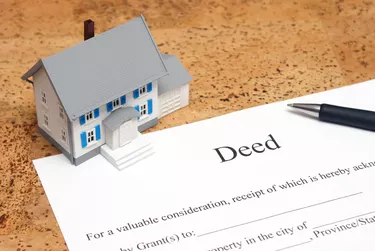
A certificate of title and a deed are both written documents used to help establish the ownership of property in a real estate transaction. Holding a deed on a specific piece of property or a certificate of title does not guarantee you actually own the property.
When preparing a certificate of title, abstractors use information from deeds to establish ownership. Understanding the difference between these two documents will help you maintain the proper records for any property you own during your duration of ownership.
Video of the Day
Video of the Day
Read More: Documents Required to Sell a House by Owner
House Title vs. Deed
In real estate, the term "title" has two meanings. It applies to one's right or ownership of land or the evidence of ownership. Title in itself is not a written document per se, yet written documents help provide the evidence of title. On the other hand, a deed is the written instrument or document used to convey title or interest in property from one party (grantor) to another (grantee).
There are a number of different deed forms, with some conveying title with specific warranties and disclosures about any debts against the property. The quitclaim deed only conveys interest the grantor has in the property; it does not promise the grantor has title to convey. Therefore, accepting a quitclaim deed on a piece of real estate does not necessarily mean the grantor has title to convey.
Read More: What Do I Do if I Lost the Deed to My House?
Certificate of Title
When you obtain a certificate of title on a piece of property, this does not guarantee you actually hold legal title. The certificate of title is simply an opinion of title status, as of the certificate's issue date, based on a title search.
Title searches – performed by attorneys, title companies or licensed abstractors – involve examining public records and the chain of title or ownership over a number of years. This is where you might discover that there is a question of ownership on a property, which you can address before proceeding any further with purchase negotiations.
Read More: Grant Deed Vs. Warranty Deed
Deeds to Convey Ownership
When you purchase real estate, the seller gives you a deed, which conveys to you the seller's interest in the property. Filing that deed according to local and state laws helps establish your ownership to the property. The party preparing the certificate of title uses information from all executed deeds on the property. During a title search, you will discover if the seller has legal title to convey.
What Is Title Insurance?
When a seller offers a general warranty deed, which provides the most amount of protection to the buyer, the seller guarantees he has title to convey and purchases a title insurance policy on the property. This protects the buyer from losses should it later be determined the seller did not have clear title to convey. This might happen if unrecorded liens or rights eventually surface.